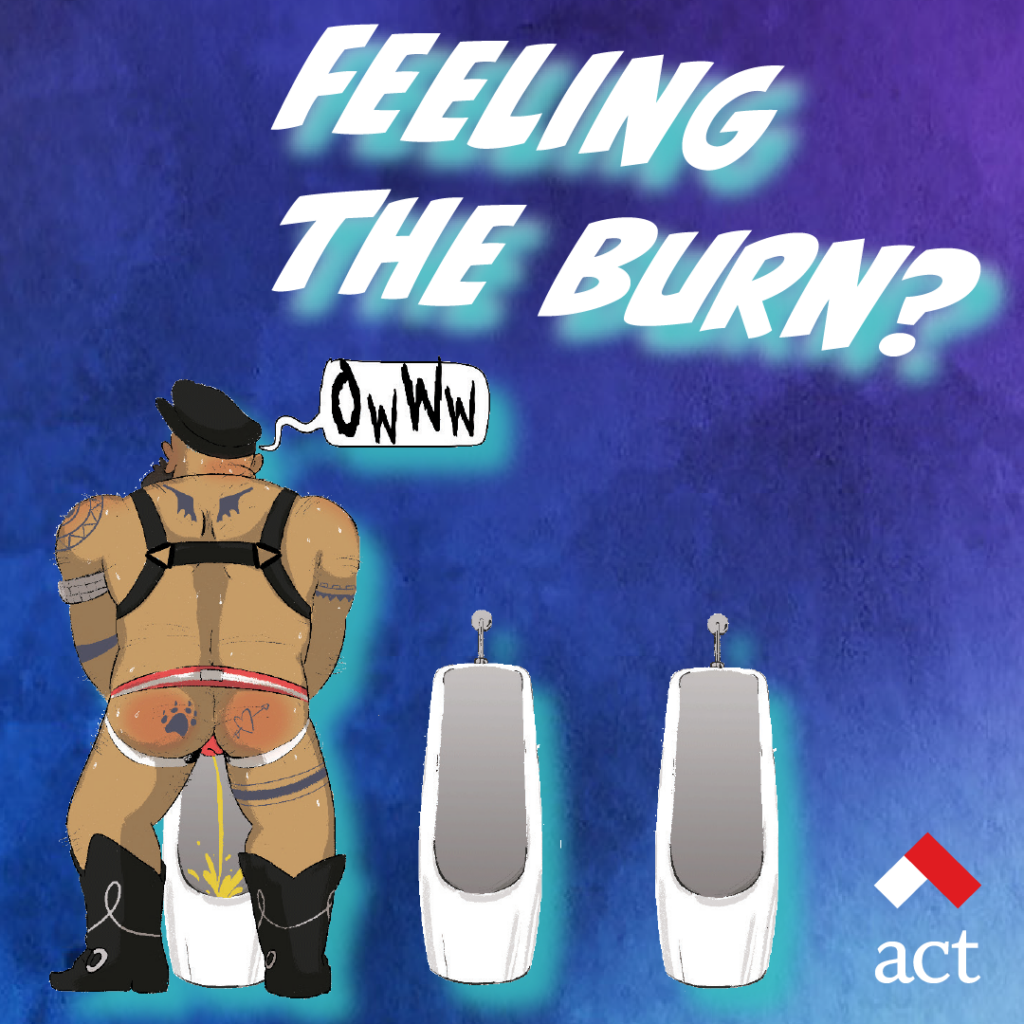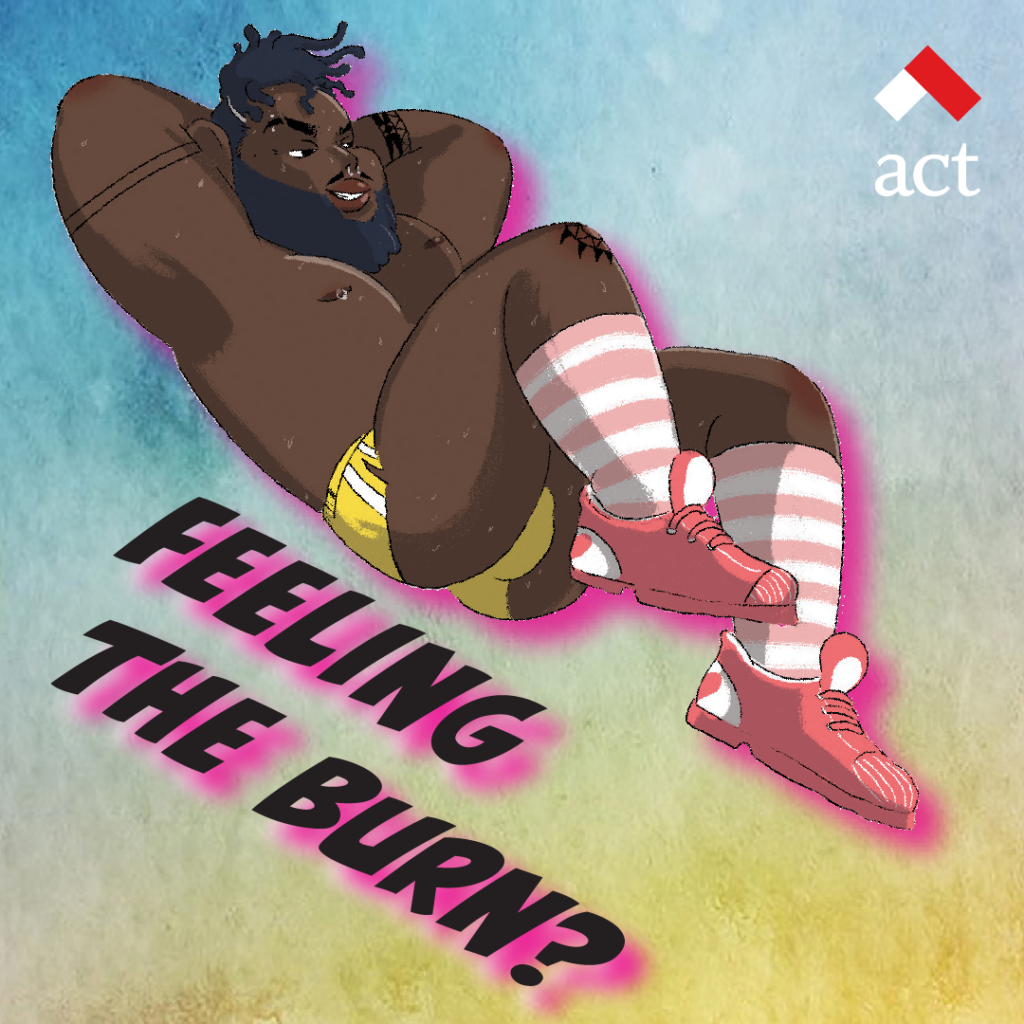Gonorrhea is a common and treatable sexually transmitted infection and is also referred to as “the clap” or “the drip” due to the frequent symptom of discharge.
How do I know if I have Gonorrhea?
The only way to 100% confirm that you have Gonorrhea is to get tested. Typically, men will notice symptoms within a week of infection. These might be a painful burning feeling when peeing, itching around the pee hole, or discharge (white, yellow, or green) from the cock, ass, or front hole.
If Gonorrhea is contracted from oral sex, the throat will be infected. This can cause swollen glands or a sore throat, but in the majority of cases there are no symptoms. Gonorrhea in the ass can lead to bleeding, discharge, soreness and itching. You might also experience painful bowel movements. If hands containing infected discharge touch your eyes, an eye infection can arise too.

What will happen at the Doctor?
The doctor will test you for Gonorrhea, either through a urine test or by taking a sample with a swab from your ass, front hole, or throat. While this sounds uncomfortable, it’s quick and is relatively painless. If your test results are positive, you will be given antibiotics in the form of pills, coupled with an injection in the ass cheek. You may also be given treatment immediately and before your test results return if your doctor notices discharge (“pus”), swelling, or otherwise strongly suspects you might have Gonorrhea.
I have Gonorrhea. What do I do?
Follow the guidance provided by your doctor, like taking medication as instructed even if your symptoms have already cleared. Avoid sex until a week after you finish your medication cycle. If you finish your medication and your symptoms continue, tell your doctor. In any case, make sure to get tested again after your medication is done to ensure that you no longer have Gonorrhea.
Also, remember that even after taking medication, you can always get re-infected from an untreated partner. Don’t forget to tell all sexual partners you’ve had in the past 2 months that they should get tested. Feel free to add that no symptoms does not mean no infection. If you don’t want to tell your partners, a public health nurse or www.inspot.org can notify your partners without mentioning your name.

Why do I have Gonorrhea?
Gonorrhea is highly contagious and spreads when contact is made with the sexual fluids, typically from unprotected oral, anal, or front hole sex of a person with Gonorrhea. It can be passed even if no one cums.
Condoms will significantly reduce your chances of getting Gonorrhea. However, since the infection is spread through touch, condoms may not completely eliminate the possibility.
Make testing for Gonorrhea a routine part of your sexual health check ups to ensure it’s caught and treated quickly. This often looks like every 6 months to a year if you regularly use condoms and have a low number of sexual partners, or every 3 months if you have a high number of sexual partners and prefer not to use condoms.
What about “Super Gonorrhea”?
Increasingly, there has been emerging worldwide resistance by Gonorrhea to the antibiotics used to treat it. This has largely been due to the over-use of antibiotics in healthcare settings as well a lack of new drugs. This has led to the fear that Gonorrhea may one day be once again incurable.
However, Gonorrhea is still very much treatable. Various health organizations around the world recommend a combination of two antibiotics simultaneously to treat and cure Gonorrhea. Strains of Gonorrhea resistant to this line of therapy have so far been isolated and none have been reported in Toronto to date.
Governments around the world have identified drug resistant Gonorrhea as a serious public health threat. As a result, there are a number of treatments currently in development from vaccines to newer, better antibiotics. However, it may be several years before these products are publicly available.

Why should I go to the Doctor?
Gonorrhea can cause serious problems for you if left untreated. Testicular swelling and pain can occur, as well as blocked pathways for sperm that result in infertility. For trans men, the lining of the reproductive organs can get seriously infected which can cause chronic pelvic pain and infertility. If Gonorrhea travels into your blood, a life-threatening infection can develop.
Some warning signs for a blood infection are skin rashes, arthritis, and tendon inflammation. Untreated STIs may also increase your chances of getting HIV from those with a detectable viral load.